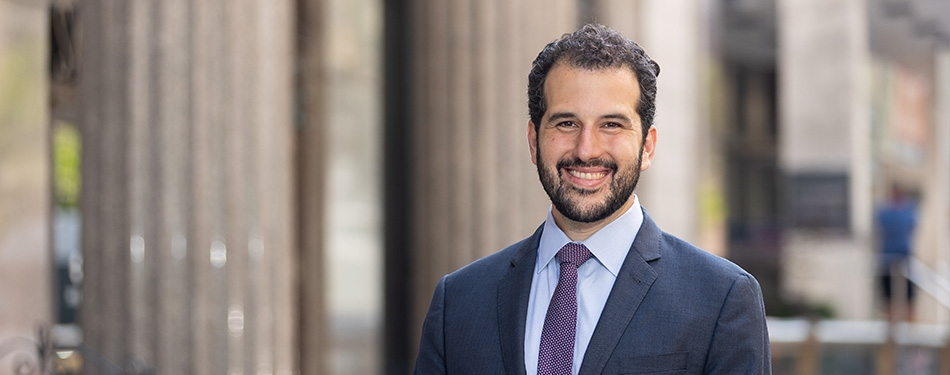Julian Arato, a preeminent emerging voice on international law and the global economy, joins the Michigan Law faculty.
Julian Arato, one of the nation’s premier emerging voices on international law, is joining the University of Michigan Law School faculty. Arato’s arrival further elevates the institution’s robust position as a scholarly leader in the ever-evolving field of international law.
“Michigan Law has played a significant role in developing and conceptualizing international law and has had amazing success in generating top-flight practitioners in the field,” Arato said. “I am so excited to join this special tradition at Michigan and help take it forward.”
The New York native’s arrival in Ann Arbor as a professor of law follows his seven-year run at Brooklyn Law School, where Arato served as professor of law and associate dean of faculty research and scholarship.
It was there that Arato solidified his reputation as a notable scholar of international law through his prolific publication of articles on international economic law, including the legal regimes governing trade and foreign direct investment, as well as international dispute resolution, the law of treaties, and private law theory.
His 2019 article titled “The Private Law Critique of International Investment Law” won that year’s Francis Deák Prize for best article by a younger author published in the American Journal of International Law (AJIL).
International law is the wild west for lawyers because the sources of law are so numerous and complex, and so often need to be interpreted and reinterpreted in the context of a dramatically changed world.
“International law is the wild west for lawyers because the sources of law are so numerous and complex, and so often need to be interpreted and reinterpreted in the context of a dramatically changed world,” Arato said. He noted that international law touches on everything from mundane aspects of daily life like postage and telecommunications to high-level matters such as war and peace or the governance of global emergencies like pandemics. “All of this makes international law an exciting field for scholars and makes for an exciting career as a lawyer.”
Leader in scholarship and active in governance
Arato is highly involved in the wider international law community. Earlier this year, he was elected to the AJIL Board of Editors, and he has served as editor of the AJIL International Decisions Section since 2020. He currently co-chairs the Academic Forum on Investor-State Dispute Settlement (ISDS) and is co-editor of The Law of the World Trade Organization, an open-access casebook on international trade law.
Arato also serves in various leadership positions with the American Society of International Law (ASIL), including recently serving on the ASIL Executive Council.
Active in governance, Arato has been an observer delegate to the United Nations Commission on International Trade Law (UNCITRAL) Working Group III since 2018, which is working on multilateral reforms to ISDS. In that role, he has helped sovereigns, governments, and international organizations understand the meaning and impact of international investment law and dispute settlement.
“Participation in this forum has been a rare opportunity to contribute to reforming a very problematic field of law, one which has an outsized impact on investors, peoples, and governments in the real world,” Arato said of his UNCITRAL service.
In June, the European Union named Arato to its newly published roster of suitable candidates for serving as an arbitrator in international trade disputes under the EU’s various trade agreements. He also was named to the new roster of suitable candidates to serve as an expert on trade and sustainable development disputes under those same treaties.
Arato’s interest in international law bloomed during a formative internship with the United Nations International Law Commission. At the UN Office in Geneva, he worked for then-Commission Member Georg Nolte on the codification and progressive development of international law, with a focus on the law of treaties.
“I found myself fully in the furnace, expected to do cutting-edge scholarly research across numerous international courts and tribunals on an ever-growing array of granular but very important legal questions,” Arato said. “The experience involved a steep learning curve, but I learned much about the state of legal doctrine and even more about the making of international law, the dynamics of international institutions, and, most importantly, the stakes of it all.”
Exploring equity and fairness through law and the global economy
In recent years, Arato’s scholarship has focused on the relationship between international law and the global economy. He is especially focused on understanding and reforming international investment law and arbitration, bringing perspectives from private law theory to develop a more equitable remedial system.
“Ultimately, I am interested in making the world a more equal and fairer place,” Arato said. “These macro questions of inequality, fairness, and justice on the international stage appeal to me precisely because our global society continues to fall so short in securing these values.”
At Michigan Law, Arato will teach courses on public international law, international economic law, and first-year contracts. In every class he leads, he aims to help students understand the broader social and political implications of their professional efforts.
“We need to appreciate these realities, because as lawyers we engage every day in a powerful social practice that shapes our individual and collective lives—in innumerable ways,” he said.
Arato earned his JD/LLM from the NYU School of Law and his JSD from Columbia Law School. Before entering academia, he worked in the international arbitration group at Freshfields Bruckhaus Deringer.
—Daniel P. Smith

